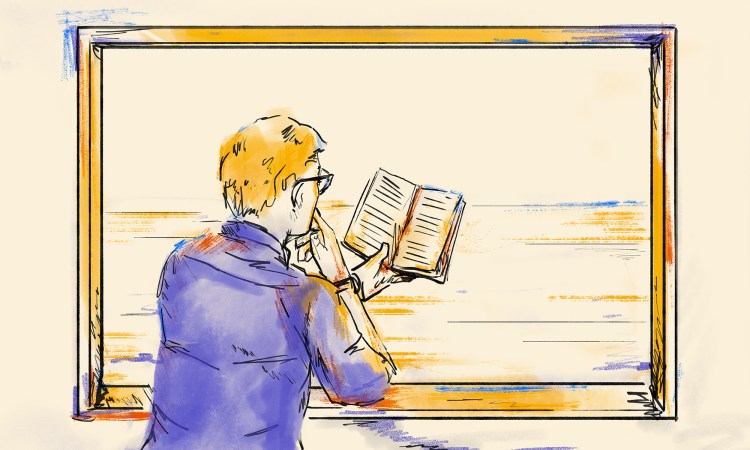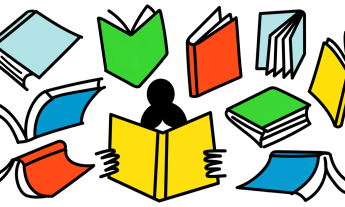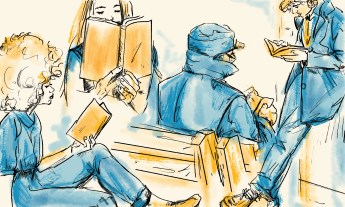
Building for Hope: Towards An Architecture of Belonging by Marwa al-Sabouni (TED Talk: How Syria’s architecture led the foundation for brutal war)
Architects do more than provide the blueprints for shelter, writes Syrian architect Marwa al-Sabouni. Instead, they respond to humans’ five basic emotional fears — death, need, treachery, loneliness and boredom — and create buildings that provide abundance, safety, creativity and community, she says.
The Handshake: A Gripping History by Ella Al-Shamahi (TED Talk: The fascinating and dangerous places scientists aren’t exploring)
Before celebrating (or mourning) the current disappearance of the handshake, consider this: The ritual of extending one’s hand as a greeting, peace offering or deal sealer has been around for millennia. The practice all but disappeared after the plague in the 14th century and the Spanish flu in 1918 only to reappear in their respective aftermaths. Paleoanthropologist Ella Al-Shamahi explores the history of this global custom, which can be found from executives in corporate boardrooms in industrialized countries to Indigenous tribes in Papua New Guinea and the Amazon.
The Frontlines of Peace: An Insider’s Guide to Changing the World by Severine Autesserre (TED Talk: To solve mass violence, look to locals)
Severine Autesserre is an award-winning peacebuilder whose humanitarian work and field research have taken her to countries deeply impacted by war, such as Kosovo, Afghanistan and the Congo. In this book, she presents evidence that while large philanthropic donations and headline-making policy changes may get most of our media attention, they are not the only tools to achieve peace. The world really can be changed one person at a time.
Whole Brain Living: The Anatomy of Choice and the Four Characters That Drive Our Life by Jill Bolte-Taylor (TED Talk: My stroke of insight)
When 37-year-old neuroscientist Jill Bolte-Taylor had a massive stroke in 1996, she lost her ability to form words and move her body, but also experienced what she would later describe in her TED Talk as “euphoria”. Here, she shares what has happened since her recovery and corrects common misconceptions about how brains function. For over 50 years, society has agreed that the brain is defined by its right (emotional thinking) and left (rational thinking) sides, but Bolte-Taylor believes that this definition is too reductive. She also contends that we have more control over how we use our brains than most of us realize. Understanding your own brain’s “characters” can help you identify how you make decisions, what gets in your way and how to achieve greater serenity.
You Are Your Best Thing: Vulnerability, Shame, Resilience and the Black Experience edited by Tarana Burke (TED Talk: Me Too is a movement, not a moment) and Brené Brown (TED Talk: The power of vulnerability)
“Systemic racism isn’t a vague notion, but a real enemy that may turn and come after me, at the moment when I am too joyful to pay attention,” writes Austin Channing Brown in 1 of the 20 essays curated by #MeToo movement founder Tarana Burke, and researcher Brené Brown. The anthology’s all-star contributors come from the fields of academia, advocacy and the arts and include YA and middle-grade author Jason Reynolds, actress Laverne Cox, and professor and UpFront host Marc Lamont Hill. In their contributions, the writers share their varied responses to the traumas of racism and systemic inequity — denying joy to one’s family out of fear, habitually “rehearsing tragedy”, and finding hope against all odds, just to name a few.
Leading from Anywhere: The Essential Guide to Managing Remote Teams by David Burkus (TED Talk: Why you should know how much your coworkers get paid)
Hard to believe, but in 2018, only about 3 percent of US employees worked from home, reports management researcher David Burkus. Then COVID hit and suddenly office buildings emptied, while bosses searched in vain for an instruction manual on how to motivate employees from afar. This guide is here to fill that void, providing research-based insights about how organizations can grow and keep their employees happy and motivated, even when we’re all online.
Remember: The Science of Memory and the Art of Forgetting by Lisa Genova (TED Talk: How your memory works — and why forgetting is totally OK)
Relax: Forgetting where you parked your car at the mall doesn’t mean your brain is getting less sharp. Chances are, you just never bothered to remember it in the first place. Neuroscientist and novelist (Still Alice) Lisa Genova explains what we remember, how we forget and why your fading memory is usually not a sign of early dementia but actually proof that your brain is working astonishingly well.
Women and Leadership: Real Lives, Real Lessons by Julia Gillard and Ngozi Okonjo-Iweala (TED Talk: 6 essential lessons for women leaders)
When women comprise roughly 50% of the global population, why do they still make up less than 10 percent of world’s leaders? Sexism and gender bias, report Julia Gillard, Australia’s first female Prime Minister and Ngozi Okonjo-Iweala, Nigeria’s former Finance Minister. For this book, Gillard and Okonjo-Iweala interview eight remarkable female leaders from all over the world — including New Zealand Prime Minister Jacinda Arden, former US Secretary of State Hillary Rodham Clinton and European Central Bank President Christine Lagarde. Among their other revelations: When it comes to barriers to political power for women, the situation does not appear to be improving. Still, these uniquely experienced women offer timely insights and hope for the future. A great read for future leaders of any gender.
Terra Incognita: 100 Maps to Survive the Next 100 Years by Ian Goldin (TED Talk: Navigating our global future) and Robert Muggah (TED Talk: The biggest risks facing cities — and some solutions)
Maps of highways, trails and the mall tell us where we are and how to get where we want to go. In this book, the maps and accompanying texts from economist and professor Ian Goldin and political scientist Robert Muggah provide a different sort of guidance. Using historical maps such as Gerardus Mercator’s world map of 1569 right on through to today’s Google Earth satellite maps, the authors trace everything from changing sea levels to pandemic patterns in order to explain where we are now and what routes to take for the safest journey into the future.
Think Again: The Power of Knowing What You Don’t Know by Adam Grant (TED Talk: What frogs in hot water can teach us about thinking again)
According to organizational psychologist and podcast host Adam Grant, people tend to think and talk in one of three ways: the preacher (who digs in their heels on personal ideologies and delivers sermons to convert others), the politician (who surveys the community and tries to win them over) and the prosecutor (who pokes holes in opponents’ arguments). Unfortunately, these mindsets are too limiting when we’re making decisions and we’d all benefit from shifting our thinking to be like scientists who float ideas, test hypotheses and last but not least, question and rethink those ideas at every turn. We would all benefit from embracing doubt, says Grant. For those who’d like to be more like a scientist, here are two ways to start: Surround yourself with people who have a variety of viewpoints, and ask open-ended questions during your disagreements. (Read an excerpt here.)
The Menopause Manifesto: Own Your Health with Facts and Feminism by Dr. Jen Gunter (TED Original Video: What really happens to your body during menopause)
Menopause is not a disease, states ob/gyn Dr. Jen Gunter, author of the best-selling book The Vagina Bible. What’s more, “hot flash” is a misnomer; she prefers hot “flush” since they often last far longer than a moment. In this book, she corrects misconceptions about this phase of life that researchers hypothesize evolved to serve a social purpose — allowing grandmothers to care for grandchildren — and provides accessible medical advice to women going through this process. (Read an excerpt here.)
The Data Detective: Ten Easy Rules to Make Sense of Statistics by Tim Harford (TED Talk: A powerful way to unleash your natural creativity)
Tips like “Search Your Feelings” (the book’s first rule), “Ponder Your Personal Experience” (the second) and “Get the Back Story” (and third) may sound better suited to helping you start a relationship than make sense of statistics. But the latter is the focus of this book from quick-witted economist and journalist Tim Harford. One standout is the section about “Premature Enumeration,” the human tendency to quickly turn numbers into ratios or other calculations without fully understanding what the numbers refer to. He believes we should all question the numbers, stats and data points until we understand them, and his writing is a great way toward achieving that understanding.
The Lonely Century: How to Restore Human Connection in a World That’s Pulling Apart by Noreena Hertz (TED Talk: How to use experts — and when not to)
Did you know that the UK appointed a Minister of Loneliness? Loneliness is a worldwide 21st-century phenomenon, according to academic and broadcaster Noreena Hertz. In addition to presenting anecdotes and research about loneliness, including one study that reveals how many people don’t know their neighbors or can’t name a close friend, Hertz suggests how each of us can connect with each other and form lasting, supportive communities. And even if you don’t identify as lonely, this book will give you insights into the pain that so many people are feeling today.
Between Two Kingdoms: A Memoir of a Life Interrupted by Suleika Jaouad (TED Talk: What almost dying taught me about living)
“What would you write about if you knew you might die soon?” asks Suleika Jaouad, who had to face her own mortality in 2011. Then, at 22, Jaouad was a recent college graduate living abroad when she was diagnosed with acute myeloid leukemia. She returned to New York City for three-and-a-half years of treatment, spending much of it in a hospital room in isolation. While there, she started a blog, which grew into a column for the New York Times, and led to long-distance friendships with readers engaged in their own battles with loss, illness and loneliness. Eventually, she travelled to visit those who wrote to her. This memoir is an account of how she healed and a look at her different journeys, whether through illness or through the world.
Professional Troublemaker: The Fear-Fighter Manual by Luvvie Ajayi Jones (TED Talk: How to be a professional troublemaker)
“This book is a middle finger up to fear,” declares writer Luvvie Ajayi Jones. In it, she unapologetically speaks truth to power, haters, cheaters, swindlers and anyone else who needs a stern talk. Chapter titles include “Dream Audaciously,” “Own your Dopeness” and “Fail Loudly.” You’ll read, you’ll laugh — and you’ll leave feeling inspired to cause some trouble of your own. (Read an excerpt here.)
Extra Life: A Short History of Living Longer by Steven Johnson (TED Original Video: The playful wonderland behind great inventions)
As recently as 1880, life expectancy at birth in wealthy countries was just 40 years old. This doubled to age 80 by 2010. Global life expectancy was a respectable 72.6 years in 2019. How did we get there? Science, says writer Steven Johnson. In particular, he credits advances in public health including vaccines, toilets and safety devices like seatbelts with granting us all those extra years to learn, create, live and, yes, read about it.
Noise: A Flaw in Human Judgment by Daniel Kahneman (TED Talk: The riddle of experience vs. memory), Olivier Sibony and Cass Sunstein
There are two factors that adversely affect our decision-making — bias, or conscience or unconscious preconceived ideas; and noise, or conflicting opinions and subjective feelings. While bias tends to get all the attention, noise can be just as destructive, say authors Kahneman (a Nobel Laureate for his work in behavioral economics and author of Thinking Fast and Slow), strategy professor Olivier Sibony and legal scholar Cass Sunstein. They provide tips to help you develop better “decision hygiene” to reduce the noise in your life and improve the outcomes of your choices.
Four Hundred Souls: A Community History of African America, 1619-2019 edited by Ibram X. Kendi (TED Talk: The difference between being “not racist” and antiracist) and Keisha N. Blain
For this volume, historians and writers Ibram X. Kendi (How to Be an Antiracist) and Keisha N. Blain (Set the World on Fire) assembled a powerhouse multi-disciplinary group of 90 historians, poets, journalists and professors. Each writer was assigned to cover five years of African-American history, starting in 1619 (with the first boat of 20 kidnapped African people being sold as slaves) up through 2019. The entries are presented in a variety of forms, including academic histories, thoughtful essays and pieces of fiction, that echo the diversity of the contributors and of African-American history itself.
Dusk, Night, Dawn: On Revival and Courage by Anne Lamott (TED Talk: 12 truths I learned from life and writing)
Giving hope to late bloomers everywhere, beloved memoirist, novelist, writing instructor and grandmother Anne Lamott chronicles life as a first-time newlywed at age 65 in her new book. Other essays touch upon surviving the raging wildfires of Northern California and monitoring the presidency of Donald Trump in real time. In trademark Lamott fashion, she shows how we can continue to choose joy, faith, love and humor even when life — and the world — brings dark times.
You’re Invited: The Art and Science of Cultivating Influence by Jon Levy (TED Talk: What makes us influential?)
Quick question: What did 1960’s white, self-described “formerly fat housewife” Jean Nidetch, the founder of Weight Watchers International, have in common with Black 19th-century formerly enslaved abolitionists Harriet Tubman, Frederick Douglas and Sojourner Truth? All of them were able to catalyze lasting change as a result of the connections they had forged with other people, according to behavioral scientist and business professor Jon Levy. Here, Levy tracks why communities are necessary for your progress and how you can build your own in order to achieve your goals and find greater life satisfaction.
Your Turn: How to Be An Adult by Julie Lythcott-Haims (TED Talk: How to raise successful kids — without overparenting)
No matter where you live, your living conditions, marital status or choice of job aren’t the only markers of adulthood, argues author Julie Lythcott-Haims. In this follow-up to her successful book How to Raise an Adult which spoke to parents, she addresses their kids — the emerging grown-ups — and tells them how they can thrive by embracing new adulthood milestones like paying your own rent, managing your own medical appointments and caring for others. Give it to the emerging grown-up in your own life.
The Sum of Us: What Racism Costs Everyone and How We Can Prosper Together by Heather McGhee (TED Talk: Racism has a cost for everyone)
White Americans today earn 13 times the median income of Black Americans, according to policy analyst and racial justice advocate Heather McGhee. Yet white Americans are far more likely than Black Americans to view racism as a “zero-sum game,” believing that if life improves for Black people, it will be at the expense of white people. McGhee presents a bracing rebuttal to this flawed thinking and creates a blueprint of how we could start to create a more equitable society for all of us. (Read an excerpt here.)
Wild Souls: Freedom and Flourishing in the Non-Human World by Emma Marris (TED Talk: Nature is everywhere — we just need to learn to see it)
Human behavior such as deforestation and breeding of exotic pets has led us to a planet with compromised ecosystems for plants and animals (and extinction for some species). Environment journalist Emma Marris invites readers to go with her on a global tour of researchers working in different habitats. She wonders: How can we humans help wild animals thrive? And what is our moral obligation to help the habitats we’ve already compromised? Marris floats potential solutions — and one of them is potentially introducing plant-based proteins to polar bears.
A World Without Email: Reimagining Your Work In An Age of Communication Overload by Cal Newport (TED Talk: Why you should quit social media)
The average number of daily business emails sent and received per person just keeps growing — from 50 in 2005 to 92 in 2011 to more than 120 by 2019. And that’s not taking into account the increased digital communication required by remote work during this pandemic, says Cal Newport, a computer science professor. In the past, he has encouraged a limit on social media and other tech because they interfere with work, especially deep work (also the title of one of his books). Here, he argues that when we constantly check our email, we’re harming our productivity and our peace of mind.
The Extended Mind: The Power of Thinking Outside the Brain by Annie Murphy Paul (TED Talk: What we learn before we’re born)
Why limit your thinking to only what happens between your ears? Science writer Annie Murphy Paul uses research to explore and explain how we can increase our knowledge and understanding by using our physical movements, the space that surrounds us and the minds of others around us, rather than relying solely on our own brains. When we tap into what Paul calls “extra neural pathways” — which include our senses — we can increase our creativity and problem-solving skills.
This Is Your Mind on Plants by Michael Pollan (TED Talk: A plant’s eye view)
Here, journalist Michael Pollan takes a close look at three mind-altering, plant-derived substances — opium, caffeine and mescaline — that have changed the world. He dives deep into the history, science and biases we hold about them to reflect on how we humans view plants and our brains, and what each can teach us about the other. A perfect read to accompany a morning cup of coffee or tea.
No One Succeeds Alone: Learn Everything You Can from Everyone You Can by Robert Reffkin (TED Original Video: 5 ways to create closer connections)
Starting from an early age, Robert Reffkin has made it his specialty to connect with people from different backgrounds and walks of life. Growing up as the only Black kid at synagogue and the only Jewish kid among his Black friends taught Reffkin “to talk to white people and Black people.” Later, as a White House Fellow and entrepreneur, he expanded his circles to “Wall Street types and nonprofit types.” In this chatty, conversational guide, Reffkin explains how reaching out to potential mentors and overcoming your fears of failure are two things — the book has more! — that can help you achieve your goals.
Futureproof: 9 Rules for Humans in the Age of Automation by Kevin Roose (TED Talk: The value of your humanity in an automated future)
Many people spend time debating the questions “Will robots steal our jobs? Or, will they end up making our lives easier?” Tech journalist Kevin Roose believes that we shouldn’t be focused on those queries; instead, we should ask “Since robots are already here, how do we work with them?” And in this book, he sets out rules to calm people’s anxieties about robotic world domination. To maintain humanity in a world increasingly relying on artificial intelligence, his common-sense principles include “Demote your Devices” and “Treat AI Like a Chimp Army” (AI is useful for some tasks but not everything). Tech is here to stay, and this user guide makes that reality an agreeable proposition.
Finding the Mother Tree: Discovering the Wisdom of the Forest by Suzanne Simard (TED Talk: How trees talk to each other)
Suzanne Simard, who was born into a family of loggers and trained as an ecologist, compares the forest floor to a human brain’s neural network. Through fungal connections, mother trees — the largest trees in the forest — are able to communicate with the youngest seedlings, emitting chemical signals that are similar to human neurotransmitters. This is how mother trees communicate with, identify and nurture their offspring. Simard’s discoveries are not only awe-inspiring, but they also challenge assumptions of how to preserve forests and what we can do to create a more sustainable future.
How the Word Is Passed: A Reckoning with the History of Slavery Across America by Clint Smith (TED Talk: The danger of silence)
In this nonfiction book, poet and journalist Clint Smith examines the legacy of slavery in the US by exploring specific locations — and they’re not all plantations in the South. The places that Smith visits, unearthing historical records and interviewing current residents, include Angola Prison and New York City. Here, he demonstrates his gift for revealing uncomfortable but illuminating truths that have been hiding in plain sight all along.
Goodbye, Again: Essays, Reflections, and Illustrations by Jonny Sun (TED Talk: You are not alone in your loneliness)
Johnny Sun is a person of many talents: He’s an MIT- and Harvard-educated producer, TV writer, creator, writer and illustrator. But don’t let intimidation of all of his credentials deter you from this book. It reads like dispatches from an old friend — his grace, gentle wisdom and humor infuse these thoughts and images (and even a recipe or two), which are loosely centered on how we find our place in the world. (Read an excerpt here.)
Sharing the Covers: Every Couple’s Guide to Better Sleep by Wendy Troxel (TED Talk: Why school should start later for teens)
Sleep has been linked to better health, greater productivity and higher life satisfaction. So, how far are you and your partner willing to go for a good night’s sleep? Opposite corners of the mattress, twin beds like Ricky and Lucy, or even further? One out of three US couples purchasing high-end homes opt for two master bedrooms, according to psychologist and researcher Wendy Troxel. Troxel traces the social history and science of sleeping with a partner and provides evidence-based advice to help you achieve more restful nights and stronger relationships, whether you’re larks or owls or somewhere in between. (Read an excerpt here.)
The Empathy Diaries: A Memoir by Sherry Turkle (TED Talk: Connected, but alone?)
These days “empathy” is an often used word but one that’s rarely defined. MIT professor, ethnographer and author Sherry Turkle defines it as “the psychological capacity to put yourself in the place of another person and imagine what they are going through.” Her memoir details the influences of two men who lacked that ability — her much-older academic husband, and her biological father whom her mother had divorced when Turkle was five (and whom she later hired a detective to find).
As a Woman: What I Learned about Power, Sex, and the Patriarchy after I Transitioned by Paula Stone Williams (TED Talk: I’ve lived as a man and as a woman — here’s what I learned)
In 2012, Pastor Paul Williams was a leader of an evangelical church. But that year, he came out as transgender — and was promptly fired from his position and ostracized by the religious community that he’d belonged to for more than three decades. Williams transitioned and became Paula, and then she experienced another shock. Her transition not only changed her body but opened her eyes. Despite having heard of the inequities, biases and challenges that women face every day, she got to experience firsthand how women are routinely overlooked and ignored. Anyone interested in transgender journeys or the vast difference between how men and women are treated by society can learn from Williams’ candid account.
You Are What You Risk: The New Art and Science of Navigating an Uncertain World by Michele Wucker (TED Talk: Why we ignore obvious problems — and how to act on them)
There’s an incredibly lengthy list of factors that affect how you evaluate any given risk. On the short list are personal history, cognitive bias, geography, upbringing and what you just ate, says author and policy analyst Michel Wucker. Identifying your “personal risk fingerprint”– all the factors that consciously and unconsciously affect how you decide — can help you better understand yourself and better select the personal, professional, financial and emotional risk to take. Hint: Reading this book is low-risk, with potential for high reward.
Not yet ready to dive into a book? Watch one of these great TED Talks about reading instead:











